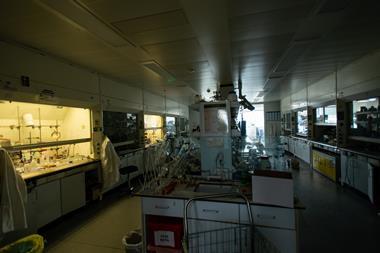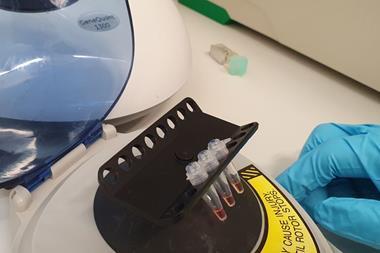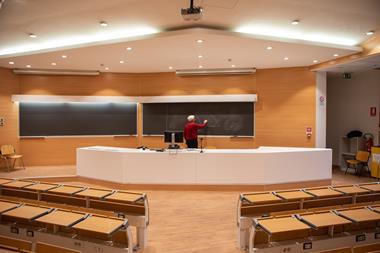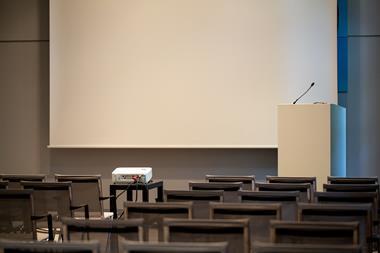More than 260 universities across the US – including Harvard, the Massachusetts Institute of Technology(MIT), Yale, Princeton, Stanfordand several members of the University of California (UC) system – have cancelled in-person lectures in response to the threat of coronavirus. Some universities are now giving lectures online and many of these universities are encouraging students to stay home after the spring holiday and continue their studies and work remotely.
Harvard ordered it students to move out by 15 March, and MIT requested that its students depart their residences by 17 March. ‘Please pack your belongings and make plans to travel home or to another location off-campus as if you do not expect to return here until the fall semester,’ said MIT’s president Rafael Reif in a letter to the MIT community.
Other universities that announced transitions to online-only courses included Columbia University, New York University (NYU), and UC Berkeley and UC San Diego.
As of 13 March, the US had more than 1700 cases of coronavirus that have resulted in 40 deaths, according to the Covid-19 tracker maintained by Johns Hopkins University in Maryland. The university moved to online instruction on 10 March and advised students not to expect to return until at least 12 April.
The American Association of Medical Colleges (AAMC) is especially concerned about the potential impact on research labs. ‘The classroom situation can be addressed, as institutions are currently doing, by moving to a virtual, online model,’ said the AAMC’s chief scientific officer, Ross McKinney Jr. ‘By contrast, laboratory work is inherently hands on and, in most cases, cannot be done remotely,’ he warned.
McKinney said that while there may be difficult challenges at institutions where buildings are closed because of concerns about coronavirus infection, lab work can continue in most cases because these facilities don’t ‘bring crowds together’.
‘I am wondering what [principal investigators] expect from graduate students with university closures, will lab life continue as normal,’ tweeted Amy Rapp, a neuroscience PhD candidate at Northwestern University who is also president of the Chicago Graduate Student Association. ‘Is it reasonable as a graduate student (especially given my asthma) to ask what our plan is?’ she asked.
‘Shut your chemistry down quickly’
Stephanie Blaszczyk, who is due to graduate from the University of Wisconsin–Madison with a PhD in chemistry in June, is still working in the lab with colleagues. However, her PI sent an email yesterday telling the team to be prepared for the lab to close at short notice, and informing them that an online platform is being tested as an alternative to regular lab meetings. ‘The email said to please be aware that you might need to shut your chemistry down quickly, so use common sense and don’t initiate reactions that will take many days to complete,’ Blaszczyk recounts. The university has suspended spring semester face-to-face instruction effective 23 March, and students should not return to halls of residence until 10 April at the earliest.
Although she feels comfortable going into the lab for now and says her university has handled the situation well, Blaszczyk does see a significant inconsistency in the approach of her institution and others. ‘The university has considered graduate students to be students when it comes to wages or benefits, which could potentially be costly to the university, but now that we are dealing with the coronavirus we are being treated as employees and still expected to show up to work day-to-day,’ she tells Chemistry World.
Although university research across the US is continuing for the moment, senior faculty at many of these institutions expect that this could change. As the virus spreads and infections occur among employees and students, they anticipate that people will eventually be banned from coming into the labs, with perhaps an exception for special circumstances.
‘I would not be comfortable requiring students to come into the lab when in-person classes are not being held,’ says Edward Kolodziej, an environmental engineer at the University of Washington in Seattle. ‘As the university has transitioned to an “essential persons only” staffing model, our research group has had a similar transition to mostly working remotely and tapering down or completing all required in person tasks in preparation for a full campus closure, which definitely includes research labs.’
Many who run academic research labs are pointing out the financial realities of the situation. It is unclear whether funding agencies will pick up the tab if labs are shuttered temporarily, or for longer periods. There is no guidance for universities in such a scenario. It is unknown whether PIs could recoup the cost of day-to-day lab operations during a period of research inactivity.
Feasible in the short-term
If universities are completely closed, Kolodziej says all lab-based studies would cease in his research group and his team would transition completely to a remote working model. ‘These options are pretty feasible and easy in the short-term, and get harder over long time periods,’ he notes. ‘That will be the same problem for ongoing research studies requiring time in the lab.’
Although much of the manuscript writing and data analysis can be done remotely, laboratory work will certainly be affected and likely delayed in some fashion, Kolodziej says. ‘On the bright side, this might be a good time to think, to write, and to organise and plan future work,’ he suggests.
At the University of California, San Diego (UCSD), researchers are already experiencing some problems with the move to remote learning. ‘It is a bit of a disruption for us,’ says Michael Sailor, a professor of chemistry and biochemistry at the university who is currently teaching a large 366 first year undergraduate chemistry class. ‘For those of us who lecture in a “flipped classroom” format or who incorporate significant student interaction during our lectures it cramps our style somewhat,’ he tells Chemistry World.
Fortunately, UCSD has already built substantial infrastructure to support online teaching. ‘Since I podcast my lectures there will not be a big disruption in terms of course content,’ Sailor explains. ‘I will still go to my class and give my lecture but there will be no one in the room there but me, a microphone and a connection for my computer.’
However, one major headache will be quizzes and final exams that may have to be administered online. ‘Quite frankly, I haven’t yet thought through how to do that as we do not have the systems in place to assure students are taking the exams alone and without help from online resources, books,’ Sailor says.
Face masks and fume hoods
So far, he says research lab work at UCSD has largely remained unaffected. ‘I have always had the policy in place that if one of my trainees feels sick they should stay home and catch up on their reading of the literature rather than coming in and making everyone else sick,’ Sailor says. ‘Also because we work with some pretty hazardous materials we have a supply of N-95 face masks already in the lab.’ He is not worried about research labs going into lockdown, pointing out that the number and density of people in them is pretty small relative to large classrooms.
However, it will be a major problem if graduate students and postdocs end up staying away for an extended period of time. ‘It will disrupt their ongoing research,’ Sailor warns. ‘In the short-term I have encouraged my students to focus on writing their papers and proposals, and catching up on their reading of the literature from home if they do not feel comfortable coming into lab; there is always a backlog of that type of work that needs to be done.’
John Zhang, who directs the NYU–East China Normal University Center for Computational Chemistry at NYU Shanghai, says the sudden move of his university and many others to online lectures is unsurprising and is not a cause for alarm. He notes that all Chinese schools, including universities, already started online teaching several weeks ago.
‘In some senses, this will help the push for online teaching and make the technology work better,’ says Zhang, who is currently at NYU in New York. At this point, he says research labs at NYU are still operating normally, but he cautions that things ‘will definitely be different’ if the situation worsens to the point where the university is forced to shut down entirely.
In Chinese universities, students are currently forbidden from returning to schools. But Zhang notes that in view of the rapidly declining number of new cases, the expectation is that universities will reopen soon. He says most cities outside of the Hubei province, of which Wuhan is the capital, have had virtually no new cases for weeks, and so the Chinese government is already preparing to reopen these institutions.

















No comments yet